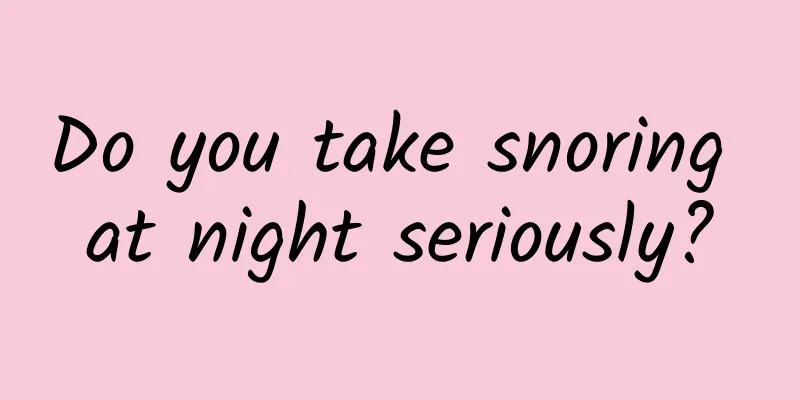Do you take snoring at night seriously?

|
Do you take snoring at night seriously? If someone in your home snores frequently, you should be careful. Let's take a case study. Case: The patient, male, 22 years old, obese, came to see a doctor for hypertension, with the highest blood pressure of 240/110 mmHg. After admission, he was given antihypertensive treatment, but the effect was not good. After the ward rounds, the attending physician was instructed to complete the sleep breathing monitoring. The results are as follows. Sleep apnea syndrome was considered, and noninvasive positive pressure ventilation was given at night, and the blood pressure remained stable. What is sleep apnea syndrome? A series of clinical syndromes caused by repeated apnea and hypopnea in patients during sleep. What are the clinical manifestations of sleep apnea syndrome? The most common symptom is repeated snoring with irregular snoring pitch. Some people are repeatedly woken up due to lack of oxygen. Some people have increased nocturia, dizziness and headache when waking up in the morning, and dry mouth and tongue. Some people have memory loss, metabolic disorders, and even sudden death. What are the dangers of sleep apnea syndrome? It can lead to high blood pressure, cardiovascular and cerebrovascular diseases, arrhythmia, diabetes, asthma, pulmonary hypertension, sexual dysfunction, cognitive dysfunction, etc. In severe cases, it can lead to sudden death. How to screen? The most commonly used method in clinical practice is polysomnography. In layman's terms, it means wearing a convenient sleep monitor before going to bed at night, which can monitor and record sleep and ventilation conditions. Who needs to be monitored? Those who have long-term and repeated snoring; Newly diagnosed hypertensive patients, especially those who are obese; Angina pectoris at night; The test found slow arrhythmia; Those with diabetes or metabolic syndrome; Elderly asthma; Increased nocturia, daytime fatigue, dizziness, and headaches; Those with chronic tonsillitis, deviated and swollen nasal septum; Those with a family history of sleep apnea and snoring; How to treat it? General treatment: quit smoking, quit drinking, lose weight, eat a balanced diet, and exercise more; use sedatives and hypnotic drugs with caution, and change sleeping position according to monitoring results. Non-surgical treatment: oxygen inhalation, non-invasive positive airway pressure ventilation, oral braces, etc. Surgical treatment: such as nasal surgery, tonsil surgery, etc. Do you know that you should pay more attention to snoring? The cover image of this article is from the copyright library and is not authorized for reproduction. |
>>: Are people who like to eat vinegar healthier?
Recommend
Not sleeping does not necessarily mean insomnia, it may also be due to "sleep procrastination"!
Author: Lei Xuexue, Jilin University First Hospit...
Be careful if you have "little black spots" on your body! People who like hiking, camping, and fishing should pay special attention to this.
Forest outings, outdoor hiking Walking the dog, c...
What is the cause of white discharge from nipples during pregnancy?
In the early stages of pregnancy, the breasts of ...
Does purulent leucorrhea need to be treated with medication?
Unhealthy leucorrhea is a natural nemesis for wom...
How to treat athlete's foot during confinement
The confinement period is one month after the bab...
What is the sand used to stir-fry chestnuts called? Why do we need sand to stir-fry chestnuts?
As people's lives become more and more abunda...
Can I eat seaweed soup during confinement and what should I pay attention to?
Our mothers who have just given birth usually hav...
Can I eat shrimp during menstruation?
Menstruation is a normal physiological phenomenon...
Dietary nutrition for pregnant women
Pregnant women, for their own health and the deve...
Women's left abdominal pain
The left side of the abdomen contains many very i...
How many days of bleeding is normal after curettage?
As economic development accelerates, medical stan...
Is the dragon bone flower easy to grow? How does the dragon bone flower grow fast?
Dragon bone flower is quite common in life. Becau...
Apple's shipments remain the largest in China's mobile phone market in 2023 and Q4
According to recent news, in recent days, major m...
8 common misunderstandings about home disinfection! Doing it wrong may cause harm
Disinfection is one of the effective ways to bloc...
Are candied dates acidic or alkaline? What are the benefits of drinking candied dates soaked in water?
Candied dates contain a lot of protein, carbohydr...









